18.12.2023• Buildings, Business, Modular Buildings, Posts & News
Repurposing Used Modular Buildings for a Sustainable Future
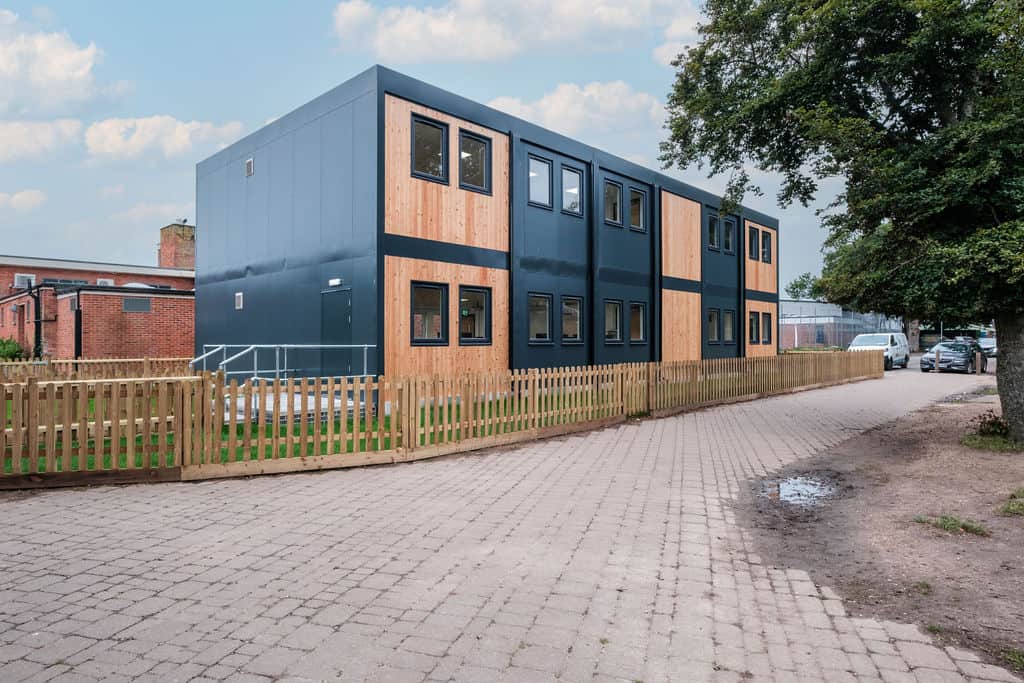
In the pursuit of a more sustainable and eco-friendly future, the construction industry has found a fantastic solution in modular buildings. These versatile structures, constructed off-site in controlled environments, offer not only efficiency and cost-effectiveness but also a remarkable potential for repurposing. Sustainability is at the forefront of many business strategies and the modular building industry plays a pivotal role in shaping a sustainable future.
Whilst new modular buildings offer a great environmentally-friendly solution to business needs, purchasing a used modular building offers even more sustainable benefits.
Modular Buildings: A Sustainable Foundation
Modular buildings offer a greener solution to construction right from the outset of their production. Modular construction involves the assembly of pre-fabricated sections, or modules, in a factory environment. These modules are then transported to the construction site for final assembly. This method minimises on-site waste, reduces energy consumption, and speeds up project timelines. Modular construction has emerged as a game-changer as the demand for sustainable building practices grows.
The inherent sustainability of modular buildings lies in their efficiency and adaptability. With precise engineering and controlled manufacturing processes, these structures optimise the use of materials, resulting in less waste compared to traditional construction methods. Additionally, the modular approach reduces the environmental impact associated with on-site activities, such as noise and air pollution.
However, the advantages of modular buildings in our surroundings don’t stop there. The flexibility of modular buildings, whilst allowing them to adapt with businesses, means that they have the ability to be reused and repurposed.
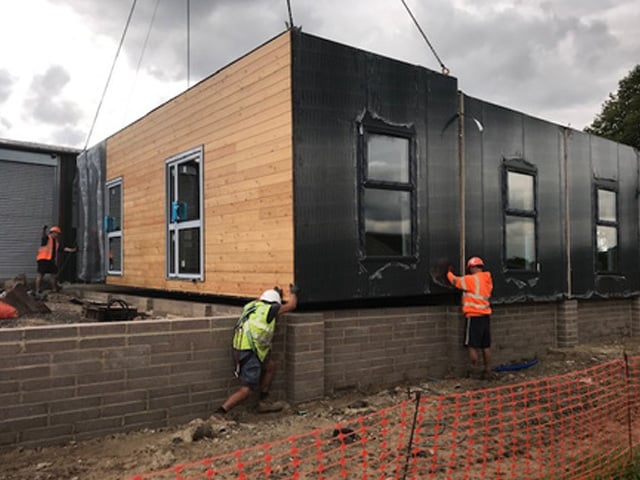
The Lifecycle of Modular Buildings: Beyond Initial Construction
One of the key advantages of modular buildings is their potential for repurposing and adaptability throughout their lifecycle. Unlike traditional structures, modular buildings can be disassembled and relocated, offering a second life to the materials used in their construction. This flexibility aligns perfectly with the principles of a circular economy, where resources are utilised efficiently and waste is minimised.
Adaptive Reuse: A Testament to Sustainability
As business needs and trends evolve, so do the requirements for buildings. Modular structures, designed with adaptability in mind, can be easily repurposed for different functions. For instance, a modular office building can be transformed into a marketing suite or repurposed for educational use. This adaptability not only extends the lifespan of the structure but also reduces the demand for new construction, further contributing to sustainability goals.
Minimising Construction Waste: A Green Essential
Traditional construction methods often result in significant amounts of waste, as materials are cut and shaped on-site to fit specific dimensions. In contrast, modular construction generates minimal waste during the manufacturing process, as each module is precision-engineered off-site. The controlled environment ensures that materials are used efficiently, with any surplus easily repurposed for future projects.
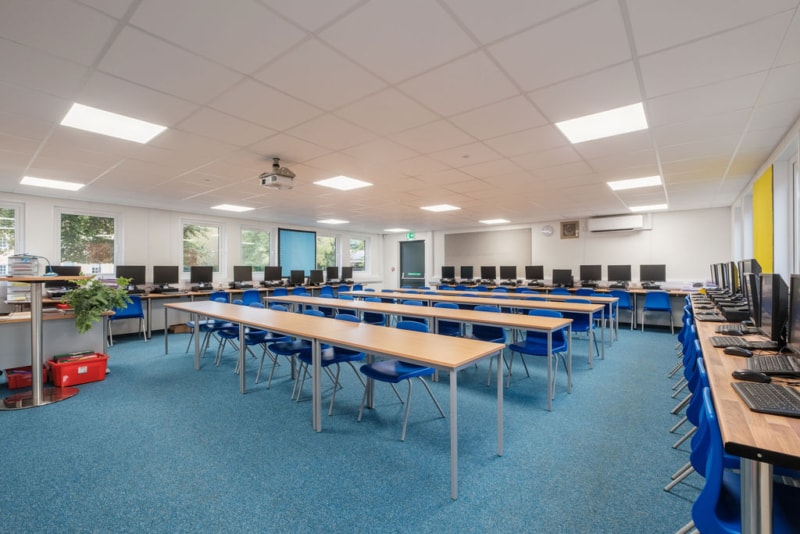
Repurposing Success Story: A Case Study
A great example of how modular buildings can be repurposed can be seen in a recent project within the education sector. It is widely understood that education has very tight budgets to contend with. So, when Priestlands School, based in the New Forest, approached PF Modular, we understood how to stretch their budget further.
As educational needs change and school populations fluctuate, modular buildings offer a flexible and cost-effective solution. Priestlands School found that they needed additional space to support their English and Maths provision. PF Modular provided the school with a repurposed and fully refurbished modular building that gave the pre-loved building a new lease of life.
These modular units were disassembled, reconfigured, and repurposed into a beautiful and inspirational space for students and teachers. The multi-storey building provided comfortable classrooms that also complemented the surrounding environment, containing listed buildings and protected trees. PF Modular demonstrated how the modular building industry addresses the education sector’s dynamic nature while minimising the environmental impact associated with new construction.
By utilising greener, sustainable buildings in an educational setting also provides our next generation with a strong message about their future. Youngsters can learn from the methods employed within the modular building industry. They can use the experience to understand the impacts of the construction industry on the future of our planet.
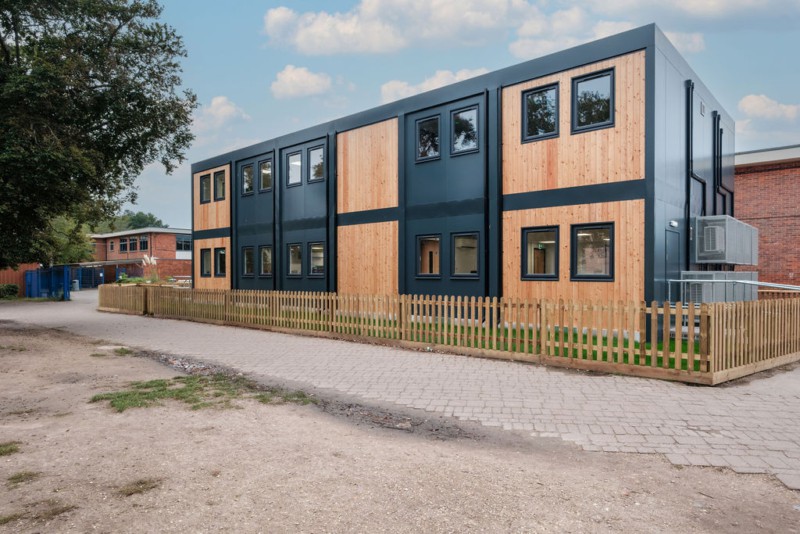
Building a Sustainable Legacy with Modular Buildings
Repurposing modular buildings represents a powerful example of the shift in the construction industry. As the demand for eco-friendly solutions continues to grow, modular building companies in the UK have the opportunity to lead the charge in transforming the way we approach construction.
The ability to repurpose modular buildings not only addresses the immediate need for sustainable construction but also helps present a lasting solution to more environmentally friendly accommodation. By adopting a circular approach to building design, we can create structures that stand the test of time, evolving and adapting to meet the ever-changing needs of society while minimising our impact on the planet.
Sustainable development and repurposing modular buildings bring together efficiency, adaptability, and environmental responsibility. As the modular building industry grows, we can show a responsibility to our future generations.
Quality Used Modular Buildings from PF Modular
PF Modular are leading the way in providing sustainability in the construction industry. Their top-quality modular buildings offer a green approach to building, an eco-friendly manufacturing process and a long-lasting solution to your business premises.
It is also a massive benefit for businesses to know that they can improve their green credentials with modular buildings. Organisations have the knowledge that their building can have a new life after its original intent has served its purpose. Furthermore, purchasing a used modular building benefits organisations whose budgets cannot stretch to a new building.
If you are looking for new premises or are looking to expand your current buildings, speak to the team at PF Modular. We’ll help you to get your new project underway with a pre-loved, refurbished modular building.
Related Posts

19.09.2024• Modular Buildings
Why Businesses Are Choosing Modular Solutions for Sales & Marketing Suites
First impressions count, and businesses need to make the most of those experiences. Sales and marketing suites offer companies a unique opportunity to showcase...
Continue Reading
17.09.2024• Modular Buildings
How Modular SEND Classrooms Are Transforming Special Education
The education sector is always changing, and the needs of students are evolving too. Schools need to provide adequate support for students with Special...
Continue Reading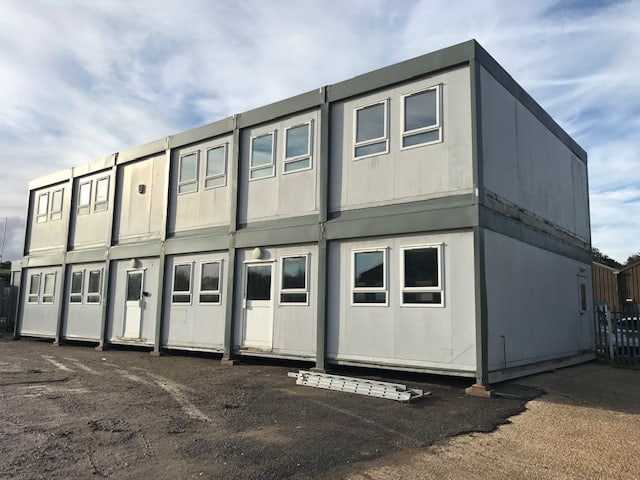
07.08.2024• Modular Buildings
What to Consider When Buying a Refurbished Modular Building
When looking for new premises, your business will have a lot to think about to ensure the buildings are right for you. Considering things...
Continue Reading